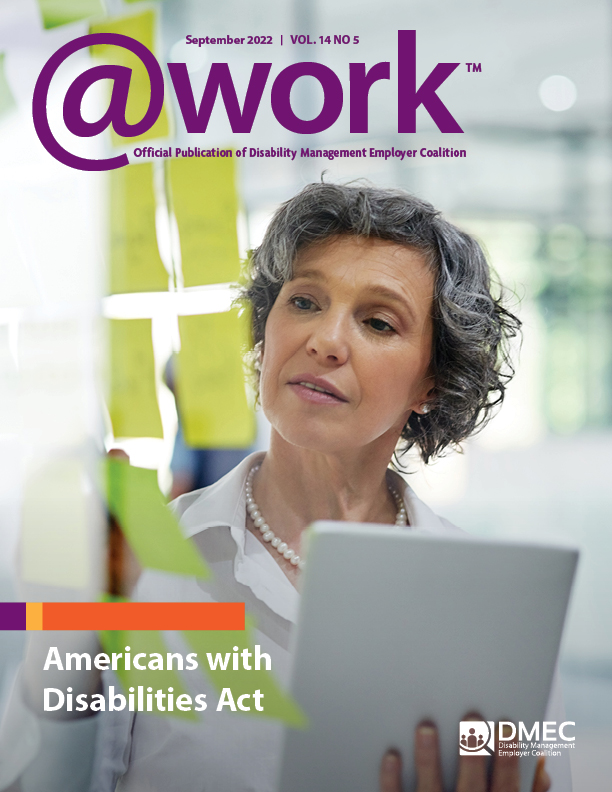
Americans with Disabilities Act
September/October 2022
Absence management professionals continue to recognize the value of reinforcing the power of tried-and-true programs and policies for the Americans with Disabilities Act (ADA). This issue of @Work magazine highlights how regular education, training, and program review ensures that teams have what they need to successfully and compliantly conduct the ADA interactive process — for regular accommodation requests as well as new challenges such as long COVID, hybrid workforces, and more.
The CEO’s Desk
ADA Compliance 101
The work we do is personal. It’s meaningful, and it’s fraught with nuances and liabilities, especially when we talk about the Americans with Disabilities Act (ADA). And since most employers manage ADA claims internally and track them manually, how do we steer clear of legal quagmires? One way is taking an individualized approach. Read more.

Features
5 Things Employers Need to Know About Accommodating Long COVID
Realizing that effective accommodations exist for virtually all limitations and restrictions and that accommodating a worker may have a positive return on investment and allow employers to avoid financial liabilities are invaluable insights for every organization looking to maximize workforce effectiveness. Long COVID, like all business challenges, presents an opportunity to organizations that address it directly and act to support their employees’ health and wellness. Read more.

Does Telework Affect Workplace Absences and Employee Well-Being?
While the evolution of work has been constant, COVID-19 was a significant catalyst in making the traditional office model more flexible. As company executives debate whether they should offer hybrid or remote options, data shows a mixed picture of how telework affects employee health and wellness and does confirm that work-from-home options save everyone money. Read more.

Spotlight Articles
Employer Perspective
Avoiding the Rabbit Hole: The County of Orange Refocuses on Process to Ensure Reasonable Accommodations
The COVID-19 pandemic taught the County of Orange team a lot about how to support employees and avoid the rabbit hole of dark possibilities when it comes to disability management precautionary practices. For human resources and disability management professionals who seek to balance employee demands with employer requirements for service or product delivery, the pandemic reaffirmed the need to communicate and follow established accommodation processes. Read more.

RTW Showcase
Leave Pain Points and Employer Solutions
Managing employee leave can be complex due to various leave options available or required by local, state, and federal laws, including the Family and Medical Leave Act, the Americans with Disabilities Act, and employer-sponsored leave programs. Employers are experiencing common issues, which can help guide future solutions. Read more.

Expanded Perspectives:
@Work to Share
DMEC provides the following @Work magazine articles and podcast episodes to offer additional perspectives on and increase awareness of integrated absence management trends and challenges. The resources — available to members and nonmembers — can be shared with your colleagues and through social media channels.
DMEC Podcast
Reimagining Employee Health Pays Off
Employers of any size that invest in integrated approaches to population health can expect to see results in employee engagement within three to six months, say experts from the University of Pittsburgh Medical Center. Listen to their story of how investing in preventive healthcare and creating a one-stop-shop for employees has resulted in an impressive return-on-investment. Listen.
DMEC Podcast
Supporting Employees and Staying Compliant Amid a Tsunami of Leave Laws
Absence management professionals are faced with an increasingly challenging landscape of paid family and medical leave laws and paid sick and safe laws. Get tips and tools for ways you can support employees and stay compliant. Listen.
Going Undercover: Why Leave Management Professionals Should Consider Secret Plan Shopping
While leave management audits help diagnose issues, they are detailed and therefore require additional time, budget, and external support. In some instances, the best place to begin — even before an audit is considered — is to go undercover and evaluate each component of your absence program and its administration through a secret shopper operation. Read more.

Scheduled Reevaluations of Accommodations Enhance Employee Experience
What worked before as an effective accommodation might need to be reviewed and reevaluated to ensure it is effective and, most importantly, up to date. As the world of work has opened up for employees with disabilities through remote and hybrid work, we should be reviewing cases and looking for accommodation solutions that are made possible through enhanced technology, flexible scheduling, and policy modifications. Read more.

How Do You Define Leadership? DMEC Emerging Leader Award Winners Share Insights
The 2022 DMEC Emerging Leader Award winners have a refreshing perspective on leadership that focuses on service, the way managers who act as guides build confidence and encourage independence, and the importance of showing up for others. Their stories offer a glimpse into work that prompted their nominations for the annual award. Read more.

Columns
Absence Matters
Don’t Leave Intermittent Absences Out of Your ADA Process
Intermittent leave has caused headaches for absence management professionals since the Family and Medical Leave Act (FMLA) was enacted in 1993. However, many don’t realize that intermittent leave isn’t just an FMLA consideration and that it can be a helpful tool. Read more.

Integrated Absence Management
Returning to Work After Long COVID: Focus on Accommodation
Long COVID or post-COVID conditions include symptoms that last a month or longer and affect up to 30% of people after acute COVID-19 infection. It is difficult to evaluate impairment, work restrictions, and accommodations, but new guidance is emerging. Read more.

Engaging Today’s Workforce
What Employers Should Know About the ADA in Light of Return-to-Office Plans
As companies roll out virtual, hybrid, or in-office work models, they should evaluate their work and accommodation policies based on new and long-standing guidance from the Americans with Disabilities Act (ADA). Employers should be mindful of the personalized needs of individuals who may qualify for reasonable accommodations under the ADA. Read more.

Employer Solutions
Keep Talking: Get Creative and Collaborative in the ADA Interactive Process
It takes a meeting of open minds to come up with a reasonable accommodation under the Americans with Disabilities Act (ADA), and an interactive conversation is the key to getting there. The interactive process, which is often an informal face-to-face meeting, helps employers and employees identify limitations and potential solutions, and it can be initiated by either party. Read more.

Common Sense Compliance
COVID-19’s Impact on Telecommuting as an Accommodation
In 2022, as leaders required employees to return to offices on a full-time or hybrid basis, employees have pushed back. Under the employment-at-will doctrine, employers generally have the right to terminate work-from-home arrangements. However, under statutory accommodation laws, employers may be required to continue to permit remote work for employees with disabilities and/or pregnancies. Read more.

Featured Case
Responding to Multiple Leave Extensions and Delayed Return-to-Work Dates
Courts differ when determining exactly how much leave is unreasonable. Some courts found that four to six months of leave is unreasonable while others say an extended leave request may be a reasonable accommodation if there is no undue hardship. In all instances, employers should conduct a case-by-case assessment of the situation and confer with employment law attorneys before making any final decisions. Read more.

Leave Technology
Leveraging Data for Successful and Seamless Leave Programs
Whether leave management is insourced or outsourced, good data is needed to support eligibility and pay calculations, employee communications, and reporting. It is a critical component and essentially the foundation of any successful leave management solution. Read more.

The Disabled Workforce
Staying Inspired as Disability Compliance Coordinators
Evaluating medical needs and exploring appropriate reasonable accommodations are not easy tasks. What can your organization do to support the teams that do this work? The answer is two-fold: Revamp your process and inspire disability compliance staff. Good processes lead to sound decisions and ensure you perform the same steps for every person. Read more.

DMEC RESOURCES
DMEC News
Meet the industry professionals DMEC recognized at the 2022 DMEC Annual Conference with the DMEC Emerging Leader Award and the DMEC Partnership Award and learn more about the latest state leave law microcredential courses released in August and September. Read more.

Legislative Updates
Check out the latest federal, state, and local compliance updates on the DMEC Legislative Updates blog. Recent posts cover updates to minimum wage and paid sick leave laws in Michigan, vetoed changes to the Massachusetts Paid Family and Medical Leave Act, Monkeypox guidance, updates to the CDC’s COVID-19 recommendations, and more. Read more.
Be sure to follow DMEC on Twitter, Facebook, and LinkedIn for additional insight and up-to-date news.

Continue the Conversation
Share insights and ideas about the Americans with Disabilities Act issue with other DMEC members in the DMECommunities ADA group. DMEC’s online networking groups give you the opportunity to connect with industry peers, ask/answer questions, share resources, and seek feedback. Get started.


@Work™ magazine is the official publication of the Disability Management Employer Coalition. Copyright© 2022, Disability Management Employer Coalition (DMEC). All rights reserved.
Editorial Policy
The goal of @Work is to present industry and Association news, highlight member achievements, and promote the exchange of specialized professional information. The statements and opinions expressed herein are those of the individual authors and do not necessarily represent the views of the Association, its staff, board of directors, or its editors. Likewise, the appearance of advertisers does not constitute an endorsement of products or services featured in this, past, or subsequent issues of this publication. DMEC makes no representations, warranties, or assurances as to accuracy of the information contained in the articles, and no content herein is legal or tax advice. Consult appropriate professionals for legal or tax advice.
Editorial Staff
Editor: Heather Grimshaw
Editorial Advisory Group: Linda Croushore, Rebecca Fisco, Steven Genduso, Jenny Haykin, Terri Morris, Fred Schott, Jessica Thornton, Lori Vickory






